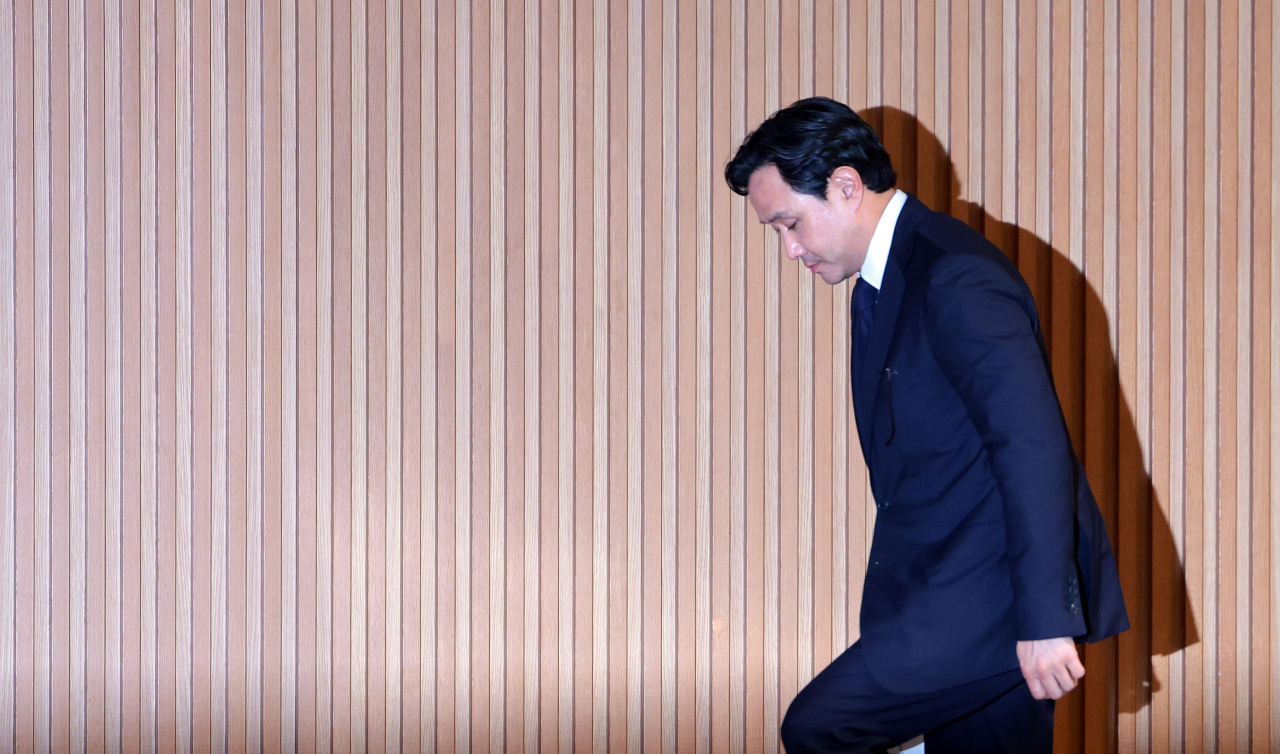Industrials
Korea Zinc buyout could jeopardize high-tech supply chains: sources
 |
Korea Zinc Chairman Choi Yoon-beom walks up to the podium during a press conference held in Seoul on Nov. 13. (Yonhap) |
Young Poong’s bid to buy Korea Zinc has been met with concerns that the takeover of the world’s largest zinc smelter could erode its position in the global markets and cause high-tech supply disruptions.
Industry watchers have cast doubt over the ability of Young Poong and private equity firm MBK Partners to run Korea Zinc, which exerts negotiation power in setting global zinc prices.
“Based on Korea Zinc’s track record in the zinc smelting market, which has been built on trust over a long period of time, we are creating a global standard that will continue to lead the market,” a Korea Zinc official said.
Since the late 2000s, Korea Zinc has set the benchmark treatment charge for zinc, the fee a smelter earns for converting mined concentrates into metal.
The annual benchmark treatment charges are renewed through contracts at the beginning of every year and used as a reference point to other smelting and mining firms in the world.
“Negotiation power in this market can be built through long-term know-how, and it is virtually impossible to approach it in the short term without a business understanding,” an industry source said.
What makes Korea Zinc a benchmark price setter is its status as the world's biggest zinc smelting company in terms of output capacity, ahead of Belgium's Nyrstar and Switzerland-based Glencore.
It is also the world’s largest buyer of zinc concentrates with an annual purchase of 1.4 million tons when combined with its Australian subsidiary SMC.
Concerns have been raised that Korea's national security and industrial competitiveness could be weakened if the alliance of Young Poong and MBK put the zinc smelter up for sale after their acquisition. Korea Zinc and a US think tank have accused MBK of having strong ties with Chinese capital.
On Monday, the Korean government decided to designate Korea Zinc's technology for producing lithium-ion battery material as a core national technology.
The decision could thwart Young Poong's plans for Korea Zinc, because it is reliant on the help of MBK, which is thought to be eyeing a second sale. Companies recognized as having national core technologies can be acquired by foreign companies only with government approval.
To fend off the takeover, Choi Yoon-beom, chairman of Korea Zinc, has been stressing the firm’s role in the production and supply of rare minerals used for high-tech and defense industries.
"Korea Zinc holds significance in establishing a stable supply chain, as some rare minerals are only produced by a few countries,” he said.
It produces bismuth and antimony and occupies more than 60 percent of the domestic market.
China has reportedly taken measures to ban exports of antimony and related metals since Sept. 15 for national security reasons. Antimony is a strategic metal used in military applications, with China accounting for 48 percent of global production.
As Donald Trump won a second term in the White House, the trade war between China and the US is highly expected to intensify to shake up the global supply chain of rare minerals.
“Despite China's export controls on antimony, Korea Zinc is putting a lot of effort into maintaining a stable supply chain,” a company official said.
Another group warily watching the dispute over Korea Zinc’s management rights is the country’s chip manufacturers, as the zinc smelter also plays a crucial role in supplying them with sulfuric acid.
“As the difficulty of semiconductor products and processes increases, any outlier in sulfuric acid quality is likely to cause serious damage to semiconductor production and quality control,” a major chip manufacturer said in a letter to Korea Zinc to ensure a stable supply of sulfuric acid.
Sulfuric acid is an essential material that acts like a cleaning agent by removing fine impurities on the wafer surface, a thin disk of semiconductor substance.
High-purity sulfuric acid is mainly used as it affects semiconductor performance and yield.
Korea Zinc’s Onsan smelter in Ulsan produces the most high-purity sulfuric acid in Korea. As of last year, the Onsan plant produced about 230,000 tons of sulfuric acid for semiconductors out of 1.4 million tons of sulfuric acid it produced.
The company supplies about 65 percent of the sulfuric acid used in Korea's semiconductor industry, approximately 240,000 tons out of 380,000 tons annually.
Some 95 percent of sulfuric acid for semiconductors produced by Korea Zinc is supplied to Samsung Electronics and SK hynix, the world's top two memory chip makers.
“A prolonged dispute over management rights of Korea Zinc could lead to supply chain risks such as disruption in sulfuric acid supply, which could also affect product competitiveness,” an official at a chip maker said on a condition of anonymity.
By Park Han-na (hnpark@heraldcorp.com)








